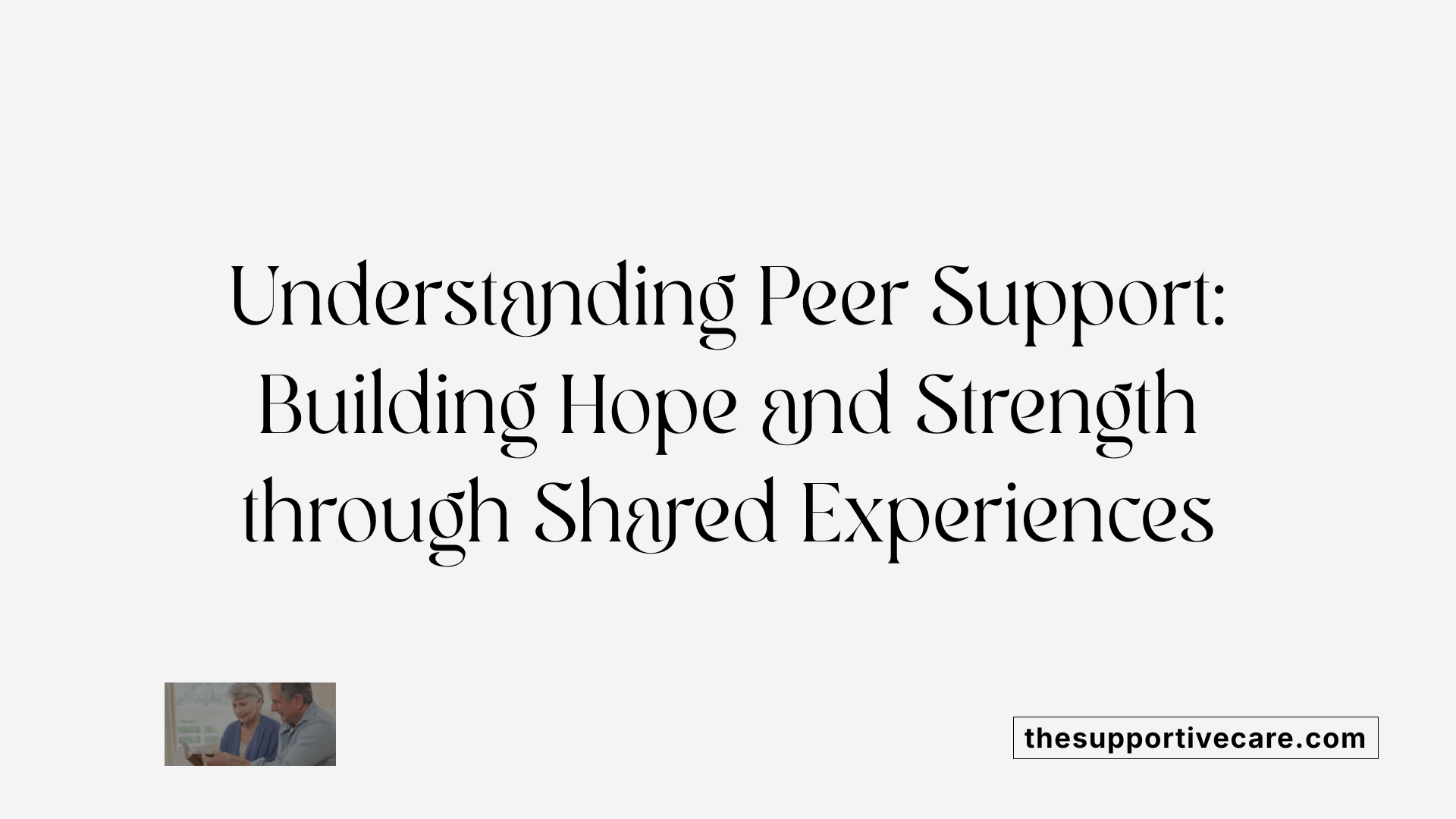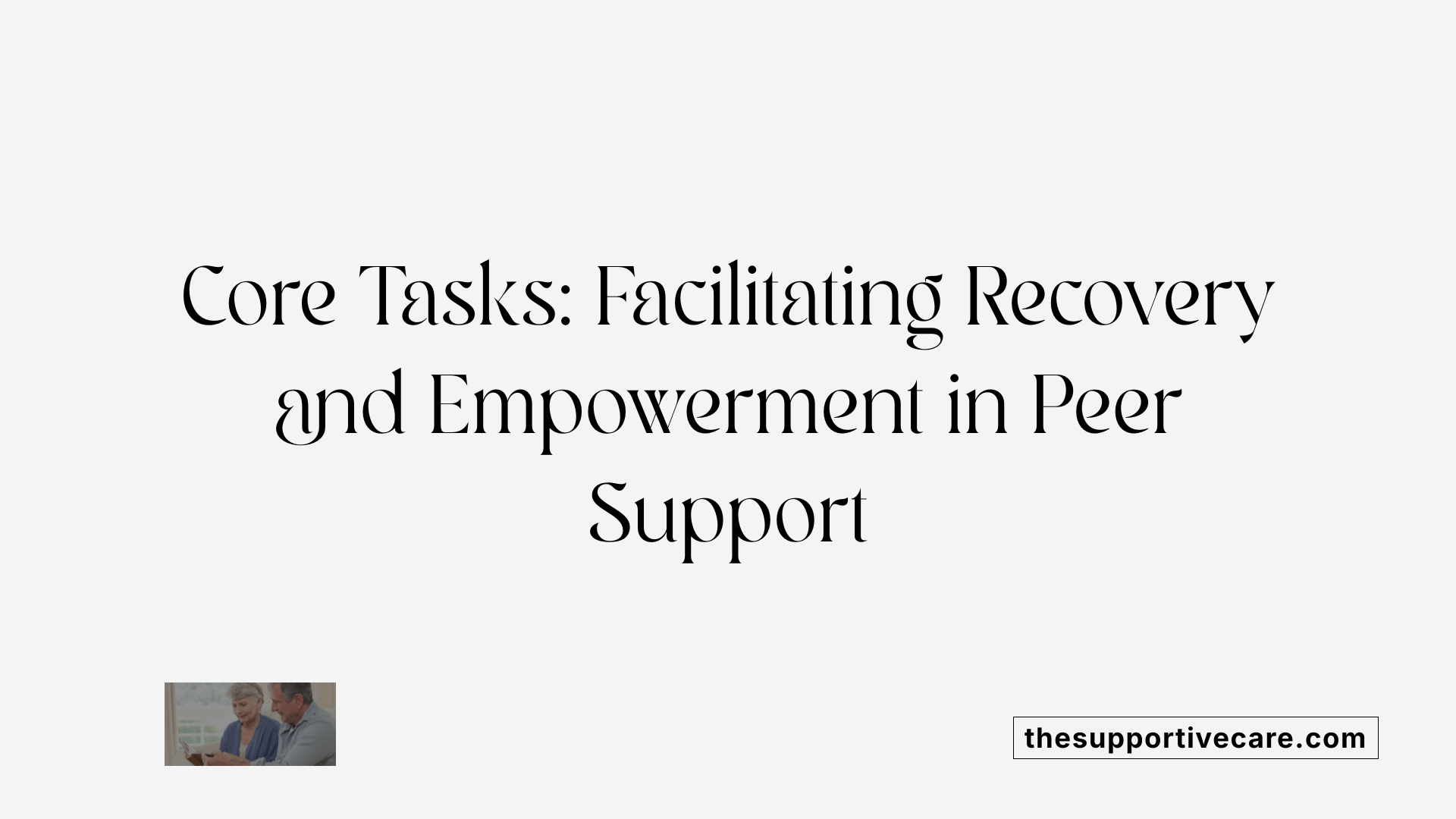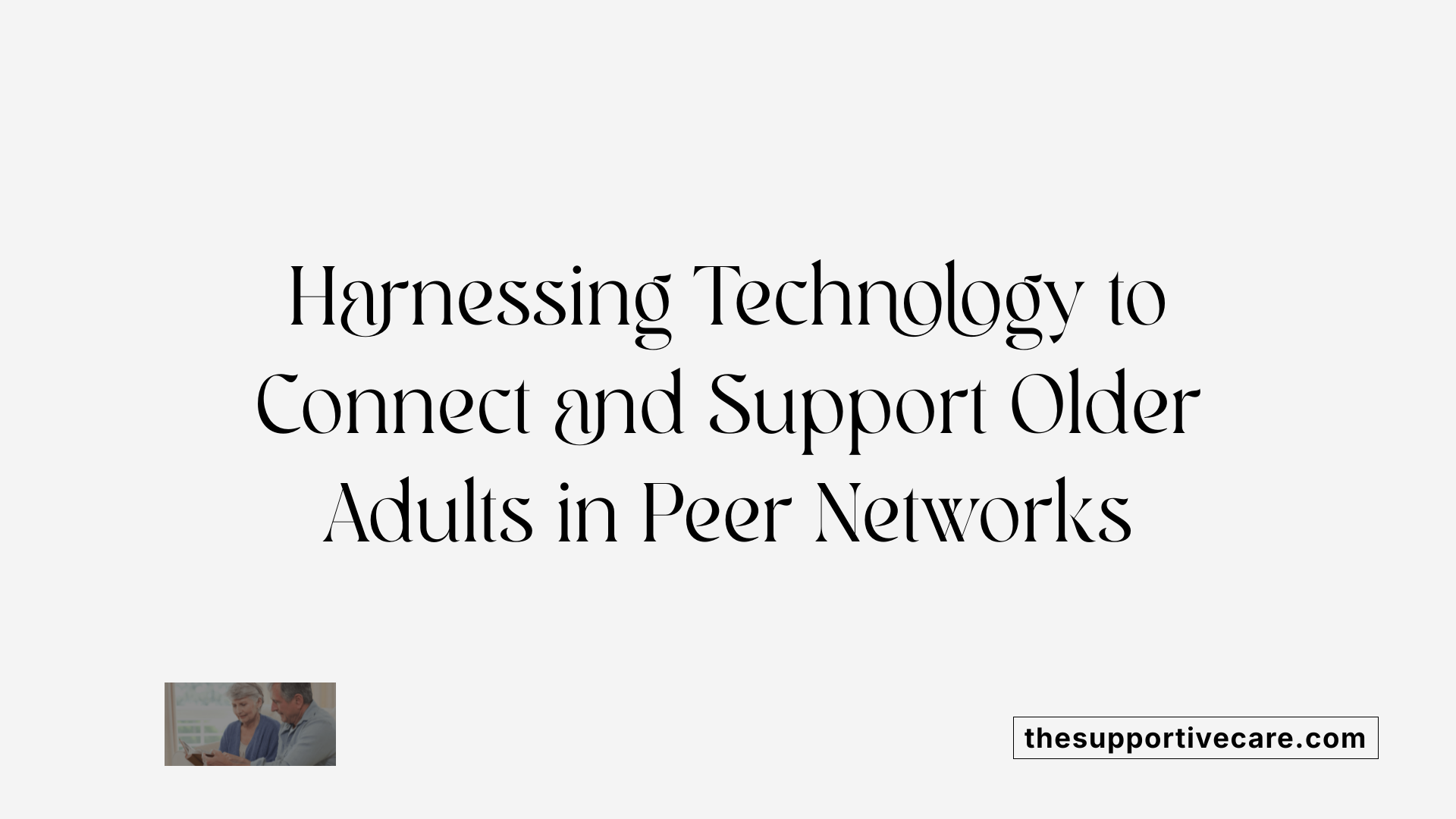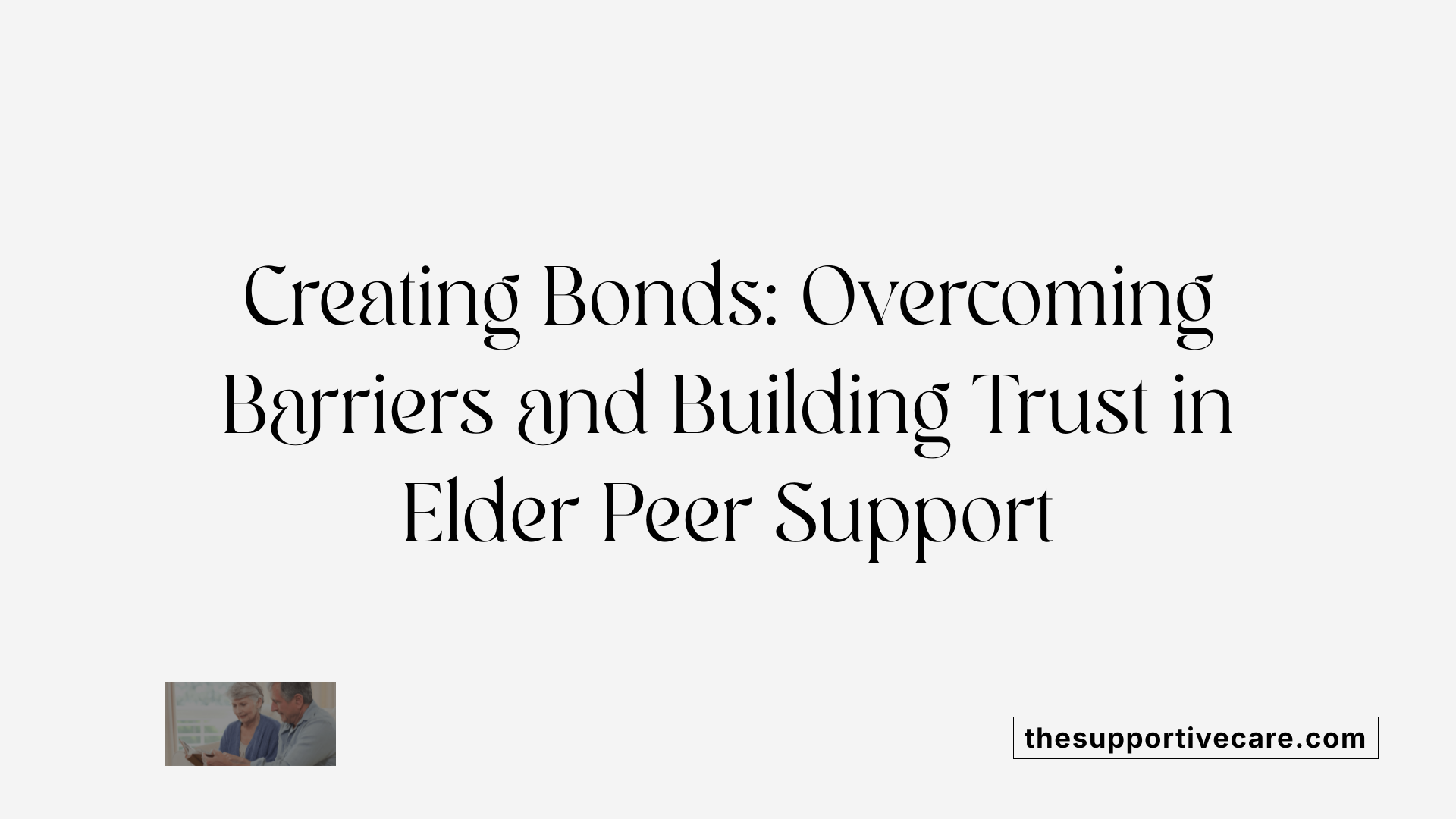Understanding the Foundations of Peer Support in Senior Behavioral Health
Peer support has emerged as a transformative element in behavioral health, particularly among older adults. Rooted in shared lived experiences, peer support offers a non-clinical, strengths-based approach that fosters connection, hope, and empowerment. As the aging population grows, understanding how peer support functions and its importance in promoting mental health among seniors becomes essential for healthcare providers, caregivers, and communities.
Defining Peer Support in Behavioral Health

What is peer support in behavioral health?
Peer support in behavioral health revolves around the meaningful interactions and activities among individuals who share similar lived experiences with mental health challenges or substance use disorders. These supporters, often called peer support workers, mentors, or coaches, use their personal journeys to help others navigate recovery.
Their assistance is non-clinical and strengths-based, focusing on fostering genuine connections, instilling hope, and empowering individuals. Peer supporters provide acceptance and understanding, validating emotional experiences that might be stigmatized in traditional settings.
Activities include helping peers identify recovery goals, develop practical coping strategies, and build self-determined lives. They often share their own stories to inspire and motivate others, demonstrating that recovery is possible.
Peer support takes place in many environments such as community centers, healthcare facilities, and criminal justice systems. Studies show that such support can significantly improve recovery outcomes by reducing feelings of isolation and stigma.
At its core, peer support promotes a recovery-oriented approach. It emphasizes mutual aid, where both supporter and recipient learn from each other. This approach not only complements traditional clinical treatments but also enhances perceptions of agency and self-efficacy.
In addition to improving individual well-being, peer support helps foster a culture of acceptance and understanding, contributing to healthier, more inclusive communities. Overall, it offers a vital pathway for recovery that emphasizes respect, shared experience, and hope.
The Crucial Role of Peer Support in Senior Mental Health
What is the role of peer support in mental health for seniors?
Peer support is increasingly recognized as a vital asset in promoting mental health among older adults. It is grounded in shared experience, creating a foundation of trust and understanding that can significantly benefit seniors facing emotional and psychological challenges.
Older adults often experience mental health issues such as depression, anxiety, and social isolation, which can be exacerbated by age-related physical health problems and life transitions like retirement or bereavement. Peer support specialists—individuals who have personal experience with similar issues—offer an empathetic and relatable presence. Through their stories and guidance, they foster hope and resilience.
These supports are available outside traditional clinical settings, using technologies like text messaging, social media, and videos to connect with seniors. Such digital platforms help bridge gaps caused by mobility limitations or geographical barriers, making support accessible and continuous.
Peer relationships in late adulthood promote a sense of belonging and acceptance, essential for emotional well-being. Seniors often find comfort in shared roles such as being grandparents or caregivers, which peer supporters can relate to and reinforce.
By encouraging proactive health behaviors and recovery strategies, peer support complements formal mental health treatment. It motivates seniors to maintain social connections, participate in community activities, and adopt healthy lifestyles—integral steps toward successful aging.
Overall, peer support in senior mental health acts as a community-driven approach that nurtures hope, reduces stigma, and empowers older adults to actively participate in their own well-being, fostering a supportive environment for aging with dignity and resilience.
Key Tasks and Approaches in Effective Peer Support

What are the key tasks of effective peer support?
Effective peer support plays a vital role in mental and physical health management among older adults. Its core responsibilities revolve around building authentic relationships based on trust and shared experience. Peer supporters focus on creating a safe and respectful environment where individuals feel valued and understood.
One of the primary tasks is facilitating problem-solving and goal-setting. Supporters help individuals identify their personal goals, develop strategies to achieve them, and explore solutions to challenges they face, whether related to mental health, physical conditions, or social isolation.
Supporting autonomy and promoting self-directed recovery are also central. Peer supporters encourage individuals to take ownership of their health journeys, reinforcing their capacity to make decisions and enact change.
In addition, trauma-informed practices and active listening are essential. Being sensitive to each person’s history and experiences helps foster a sense of safety and trust. Supporters listen attentively, validate experiences, and avoid imposing solutions, which promotes empowerment.
Overall, the essence of effective peer support lies in relationship-building rooted in mutual understanding, respect, and shared knowledge. It shifts the traditional help paradigm into a collaborative process designed to strengthen individuals’ resilience and self-efficacy.
| Task | Description | Impact |
|---|---|---|
| Building trust | Developing genuine relationships based on shared experiences | Facilitates open communication and engagement |
| Problem-solving | Assisting in identifying challenges and solutions | Empowers clients to manage their conditions more effectively |
| Goal-setting | Helping define and pursue personal recovery goals | Promotes motivation and direction in recovery |
| Supporting autonomy | Encouraging self-directed decision-making | Enhances confidence and independence |
| Trauma-informed approach | Practicing active listening and sensitivity | Creates safe spaces and promotes healing |
This holistic approach to peer support ensures that individuals feel supported, respected, and empowered, fostering long-term recovery and well-being.
Technological Innovations in Peer Support for Older Adults

How does technology facilitate peer support among older adults?
Older adult peer support specialists are leveraging various digital tools to better support middle-aged and senior populations. They often use smartphones, social media platforms, messaging apps, and video-sharing sites like YouTube to connect with their peers.
This digital approach allows for consistent and accessible communication beyond traditional healthcare settings. Whether through text messaging or video calls, older adults can receive ongoing emotional support, health advice, and companionship.
Themes such as empowerment through technology, sharing coping skills, and exchanging wisdom about age-related changes often emerge during these exchanges. The use of these platforms helps demystify health management and fosters a sense of community and mutual understanding.
Integrating digital tools with peer support not only enhances engagement but also encourages the development of self-management skills. For example, older adults can access instructional videos, health tips, and online support groups tailored to their needs.
Furthermore, digital self-management interventions provide avenues for older adults with serious mental health conditions to maintain independence, manage symptoms, and connect socially. Technology-enabled peer support bridges gaps caused by geographical or mobility barriers, making mental health care more accessible.
By aligning with seniors’ increasing familiarity with technology, these innovations help promote resilience, facilitate recovery, and prevent social isolation. Ultimately, technology-enabled peer support offers a dynamic and inclusive approach to supporting aging populations in their mental and physical health journeys.
Building Trust and Overcoming Barriers in Elder Peer Support

What factors contribute to successful peer support relationships among seniors?
Building successful relationships in elder peer support hinges on establishing trust rooted in shared experiences and characteristics. When peer supporters and older adults have common physical health issues, such as pain, vision problems, or mobility challenges, it creates a foundation for relatable and open communication.
Shared age-related experiences, including roles as parents or grandparents, deepen the bond by fostering understanding and empathy. These commonalities make it easier for older adults to open up, share struggles, and develop supportive alliances.
Cultural perspectives also play a critical role. For instance, in some communities, discussing physical health and age-related changes openly encourages mutual understanding. Conversely, stigma and stereotypes about mental health and aging can act as barriers. Addressing these stigmas is essential to facilitate engagement and foster trust.
Relationships based on similarities—such as age, gender, health status, and living environment—help create emotional bonds that resemble kinship. These bonds promote ongoing participation in support activities and recovery efforts.
Overcoming barriers like mental health stigma and social isolation enhances the effectiveness of peer support. When obstacles are addressed, supportive alliances flourish, encouraging older adults to stay actively involved, share their wisdom, and leverage technology for self-management.
In summary, successful peer support among seniors depends on trust built through shared physical and life experiences, cultural sensitivity, and proactive efforts to minimize stigma. These elements help create supportive, enduring relationships that significantly contribute to health, well-being, and successful aging.
Evaluating the Effectiveness and Outcomes of Peer Support Programs

What evidence supports the effectiveness of peer support in senior behavioral health?
Research into older adult peer support programs demonstrates several promising benefits. Studies have documented reductions in depression scores among seniors participating in peer-led interventions, indicating improvements in mental health. Additionally, these programs are linked to fewer hospital admissions and lower healthcare costs, such as decreased inpatient days and pharmacy expenses. Increased self-management and better treatment adherence have also been observed, highlighting how peer support can empower older adults to take an active role in their wellbeing.
However, not all outcomes are uniformly positive. Some research points out that peer programs may not significantly slow the natural health decline associated with aging. Effectiveness can depend on various factors including program structure, trainer expertise, and participant engagement.
Overall, the evidence supports the role of peer support in enhancing quality of life, fostering social connections, and supporting recovery. Nonetheless, there is a recognized need for more rigorous evaluations, such as well-designed randomized controlled trials, to firmly establish long-term benefits and optimize program design. As the field expands, ongoing research will be vital in confirming these benefits and guiding best practices for senior mental health support.
Harnessing Peer Support to Foster Aging Well
In conclusion, peer support represents a vital component in the behavioral health landscape for seniors. Its ability to foster trust, connection, and empowerment can transform the mental health experience of aging individuals, addressing issues such as depression, social isolation, and chronic physical conditions. The integration of technology enhances accessibility and engagement, while culturally sensitive approaches deepen relationships and effectiveness. Although research supports its benefits, ongoing studies are essential to optimize programs and demonstrate sustained impact. As communities and health systems recognize the value of peer support, expanding and refining these services will be key to promoting healthy, resilient, and connected aging populations.
References
- Older Adult Peer Support Specialists' Age-Related Contributions to ...
- peer-to-peer experience of supporting community-dwelling older ...
- The Importance of Peer Support - Safety and Justice Challenge
- [PDF] PEER SUPPORT SERVICES - ACL.gov
- Peer support: Research and reports | Mental Health America
- Peer Support Training | PEERS: Seniors in Partnership | MHAMD
- 'It was the deepest level of companionship': peer-to-peer experience ...


































































































